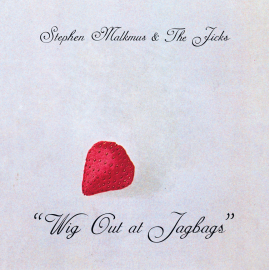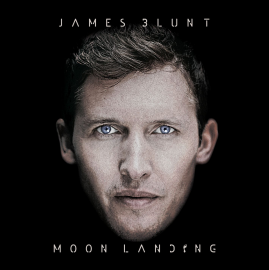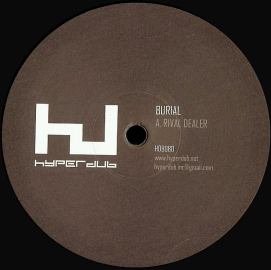Print Edition: January 8, 2014
Stephen Malkmus
Wig Out at Jagbags
Stephen Malkmus has always walked the line between drifting and stability with song structure, whether it was with Pavement in the ‘90s or the Jicks in the 2000s. He inserts false endings, (see “One Percent of One”) and often pulls out his falsetto to add a sense of emotion and vulnerability, which culminates in the odd, yet effective design of Malkmus’ songs. When he can balance this deconstruction of the pop/rock music genre with infectious guitar lines, all Malkmus needs to worry about are lyrics. Always sly and clever, Malkmus just needs the precise proportion of sneer to seriousness, and here on Wig Out at Jagbags, he hits all his marks, demonstrating the best traits of his songwriting. “We lived on Tennyson and venison and The Grateful Dead / It was Mudhoney summer, Torch of Mystics, Double Bummer” he sings on “Lariat”, with lyrics that are a little too overworked to be labeled as astute, but grounded enough to be dubbed outlook. Now 47 years old, the aging rocker does deal with nostalgia in his lyrics on Wig Out, but don’t indicate that another Pavement reunion is in the cards for Malkmus, who is on quite a roll with his last two releases.
One Direction
Midnight Memories
In July 2013, One Direction released the lead single for their end-of-the-year release. Although “Best Song Ever” was a catchy song, it was forgettable amid other chart-toppers from Miley Cyrus and Robin Thicke. Upon listening to the album, it turned out to be enjoyable, ranging from heartbreak ballads to straight pop. Not quite the empty stereotype of a boy band, the group’s members contribute to 12 of the 14 tracks — not always the norm.
However, it’s not new — there’s some surprising lyrical maturity, but Midnight Memories mostly includes tracks that sound as though they could have been released by other artists. “Little Black Dress” sounds reminiscent of The Cars, and the title track nearly quotes Def Leppard’s “Pour Some Sugar on Me.” Although some of the tracks on the album are quite good, their reliance on old genre standbys makes them forgettable.
James Blunt
Moon Landing
A decade ago an album appeared from a new British musician with one song in particular gaining mass appeal. It was taken as a soul-bearing ballad, given nonstop radio play, and used in a broad array of television shows. The song was “You’re Beautiful,” the album was Back to Bedlam, andf the artist was James Blunt. At the time it meant so much and the album was full of amazing tracks — for a ten-years-younger self. Unfortunately, over time Blunt has taken a lot of flak for his style. His two albums since also lost their magic. But somehow Blunt has managed to stay relevant, albeit mostly in the UK. At first Moon Landing really disappointed. Blunt fails to grab at those heartstrings as he did all those years ago. But after accepting that fact, this album is actually fairly decent. “Satellites” is the first song to grab attention. Lyrically, it doesn’t have much to offer, but it’s a perky track. “Bonfire Heart,” the first single, really gets by through an instrumental and a punchy chorus. It is “Bones,” though, that really makes a case as the lyrical heavyweight track. It explores what are perhaps the trials Blunt persevered through while gaining his initial success. It starts off ringing true, but disappointingly loses the thread when the chorus hits — it’s shallow, and likely a future single. In the end, the album lies in mediocrity. It’s not terrible, but it’s also not what one would hope Blunt be a decade after “You’re Beautiful.”
Burial
Rival Dealer
Rival Dealer contains the most dialogue of any Burial (William Bevan) album. Where previously the London-based, genre-resistant, mostly private electronic recording artist mostly sampled movies as brief context-less references or final fadeout, Rival Dealer is filled with it. Song titles used to provide a hint at what Burial was making music toward (“Loner,” “Truant”) but with his fourth EP exploring his own definition of what a track is (usually 7+ minutes, often interrupted into segments), Bevan says he made the album to “protect against unkind people, dark times, and self-doubts.” As dramaturgy, it’s pretty weak, with the clips sounding out that “you are not alone” surrounded by the usual mix of scrambled beats and distorted static. That Rival Dealer is sentimental, in the way that Final Fantasy cutscenes are sentimental, is obvious, but welcomed by Bevan, who dubs these “anti-bullying tunes.” Underground cathedral chorus and electric piano summon someone saying “don’t be afraid to step into the light” on “Come Down To Us,” and Bevan, who still possesses a unique sense for the way memory can obsessively play with phrases, clearly doesn’t mind that for long stretches Rival Dealer sounds like backing for religious testimony. He believes in the possibility of every word and pulse of music changing people’s lives.






